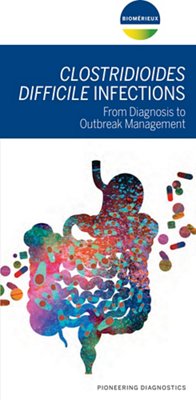What is a Gastrointestinal Infection?
Gastrointestinal infections are viral, bacterial, or parasitic infections that cause gastroenteritis, an inflammation of the gastrointestinal tract involving both the stomach and the small intestine.1,2 Symptoms include diarrhea, vomiting, and abdominal pain. Warning signs include fever, bloody diarrhea, dehydration, and hospitalization. Most gastrointestinal infections are self-limited and resolve within a few days. However, in a healthcare setting and in specific populations (newborns/infants1, immunocompromised patients3, elderly populations, and travelers), they can be potentially serious and difficult to treat. In addition, some GI infections can lead to outbreaks. Rapid diagnosis, appropriate treatment, and infection control measures are therefore particularly important in these contexts.
What is the healthcare burden of Gastrointestinal Infections?
Gastrointestinal infections are among the most encountered infections in primary care.4
- > 200 million episodes/year of infectious gastroenteritis in US5
- Worldwide 3-6 million children die each year from infectious gastroenteritis6
- Outbreaks of gastrointestinal infections are a serious concern in the hospital environment7
Additionally, several gastrointestinal pathogens cause similar, overlapping symptoms, which makes it difficult for clinicians to determine the right tests to perform. In the case of patients with Inflammatory Bowel Disease (IBD), similar clinical presentations and laboratory findings in IBD relapse and enteric infections pose barriers to accurate diagnosis and treatment.8 In both cases, traditional methods of pathogen identification can be time consuming and lack sensitivity, prolonging time to accurate diagnosis.
Among the gastrointestinal pathogens, Clostridioides difficile (C.difficile) is one of the leading causes of acute gastroenteritis and one of the most challenging healthcare associated infections. It is highly transmissible, specifically because its spores survive for long periods of time outside the body, which also makes it difficult to treat. C. difficile infection (CDI) generates costly treatment, patient isolation, and longer hospital stays.9
Time-consuming and labor-intensive processes that lead to low diagnostic yield combined with the ongoing threat of C. difficile create a significant burden on our healthcare systems.
What is Our Solution for Gastrointestinal Infection Diagnosis?
It is imperative that clinicians are armed with the right tests to efficiently and accurately diagnose the infection. Fortunately, our BIOFIRE® FILMARRAY® Gastrointestinal (GI) Panel provides fast, accurate answers on a comprehensive menu, enabling hospitals and clinics to test for 22 possible pathogens in one fast and accurate test— giving patients concrete answers while providing clinicians the results they need to make timely, targeted treatment decisions ultimately reducing antibiotic delays, length of hospital stays, and unneeded downstream procedures.
Our traditional VIDAS® automated tests improve the efficiency and accuracy of serological diagnosis performed on stool samples. And, our culture media range is composed of various formulas to help detect the right pathogens contributing to gastrointestinal infections. The CHROMID® range for GI infection has been designed to more specifically highlight Salmonella spp., Campylobacter spp., Vibrio spp., and C. difficile.
Gastrointestinal Infections - Our Diagnostic Offer
bioMérieux offers comprehensive solutions with varied approaches for detecting, identifying, and treating Gastrointestinal Infections, investigating the role of microbiota in GIs, and combatting HAIs. From our most advanced syndromic approach to our trusted conventional methods, bioMérieux has the GI diagnostic solutions available to serve GI-related challenges and meet our customers’ Antimicrobial Stewardship goals.
Disclaimer: Product availability varies by country. Please consult your local bioMérieux representative for product availability in your country.
-
BIOFIRE® FILMARRAY® TORCH
Easier testing. Faster results.
Syndromic infectious disease testing with BIOFIRE® FILMARRAY® TORCH is the fastest way to better results.
-
BIOFIRE® FILMARRAY® Gastrointestinal (GI) Panels
1 Test. 11 or 22 Targets. ~1 Hour
BIOFIRE FILMARRAY GI Panels are fast and sensitive molecular stool testing methods for infectious gastrointestinal disease.
BIOFIRE® FILMARRAY® Gastrointestinal (GI) Panel tests for 22 targets from one patient sample. Its comprehensive menu includes 13 bacteria, 5 viruses and 4 parasites commonly associated with infectious gastroenteritis.
BIOFIRE® FILMARRAY® Gastrointestinal (GI) Panel Mid tests for 11 targets and offers clinicians another GI testing option. Its menu includes 7 bacteria, 1 virus and 3 parasites associated with infectious gastroenteritis.
-
VIDAS® C. difficile Panel
Rapid identification of C. difficile infection
The VIDAS® C. difficile Panel includes two complementary tests that aid in the diagnosis of C. difficile infection.
-
VIDAS® KUBE™
Stackable benchtop automated immunoassay solution
VIDAS® KUBE™ is designed to preserve everything labs appreciate about the VIDAS® Solution combined with advanced technology. VIDAS® KUBE™ is a truly flexible, cost-effective automated immunoassay solution providing fast results in complete confidence.
-
VIDAS® 3
Trusted. Robust. Innovative.
With its advanced immunoassay technology and optimized testing protocols, the fully automated VIDAS® 3 benchtop immunoanalyzer empowers your lab with confidence, offering the precise results you need, when you need them.
-
PREVI® COLOR GRAM
A Market-Leading Automated Gram Stainer Offering Confidence in Results
Gram staining is a key step in your microbiology workflow, and PREVI® COLOR GRAM is the system to streamline it and provide timely staining results for impactful decisions.
-
WASP®
Automated Microbiology Specimen Processing Instrument
Quality diagnostic results depend on high standard specimen processing. WASP® is the smart solution for truly comprehensive automation – taking you far beyond plating and streaking to address all aspects of microbiology specimen processing.
WASP® System is manufactured by COPAN Company. -
WASPLab®
Integrated Lab Optimization and Automation
The flexible automated specimen processing, incubation, and reading solution that adapts to your unique lab setup and workflow – and even grows with you over time.
WASPLab® System is manufactured by COPAN Company. -
BIOMÉRIEUX EPISEQ®
Next Generation Sequencing (NGS) Data Analysis Platform
Provides easy-to-use applications for clinical microbiologists: bacterial and fungal identification, clinical pathogen outbreak management, microbiome profiling, and SARS-CoV-2 genomics variants identification.
Useful Resources on Gastrointestinal Infections
Contact Us
References
1. Diarrhoeal Disease. World Health Organization, 2017.
2. Illness Prevention Resources, Frequently Asked Questions. Centers for Disease Control and Prevention, 2018.
3. Alby, Kevin and Nachamkin, Irving. Gastrointestinal Infections. Microbiology Spectrum, 2016.
4. Fletcher, Stephanie M., McLaws, Mary-Louise, and Ellis, John T. Prevalence of Gastrointestinal Pathogens In Developed and Developing Countries: Systematic Review and Meta-Analysis. Journal of Public Health Research, 2013.
5. Moon, Rena C. MD, MPH, et al. Epidemiology and Economic Burden of Acute Infectious Gastroenteritis Among Adults Treated in Outpatient Settings in US Health Systems. The American Journal of Gastroenterology, 2023.
6. Rivera-Dominguez, Gilberto and Ward, Rebecca. Pediatric Gastroenteritis. National Library of Medicine, 2023.
7. Sood, Geeta and Perl, Trish M. Outbreaks in Health Care Settings. PubMed Central, 2016.
8. Axelrad, J. E., A. Joelson, P. H. R. Green, G. Lawlor, S. Lichtiger, K. Cadwell and B. Lebwohl (2018). "Enteric Infections Are Common in Patients with Flares of Inflammatory Bowel Disease." Am J Gastroenterol 113(10): 1530-1539.
9. CDC’s 2019 Antibiotic Resistance Threats Report.











